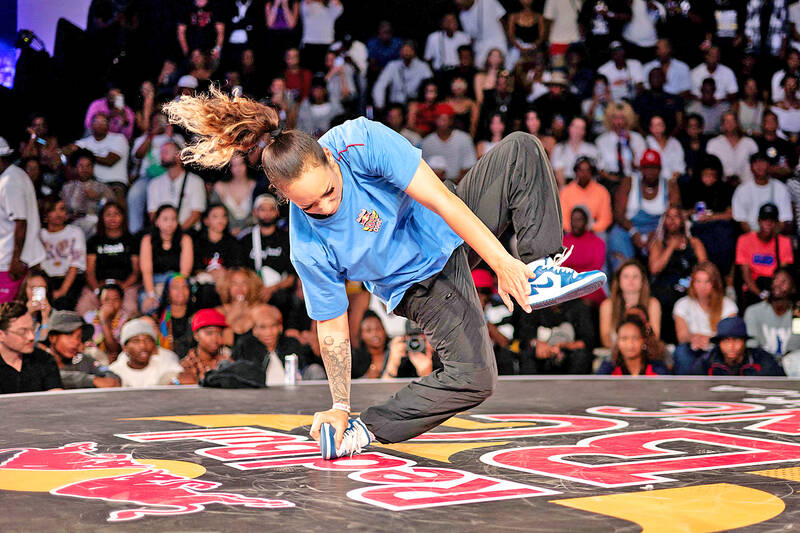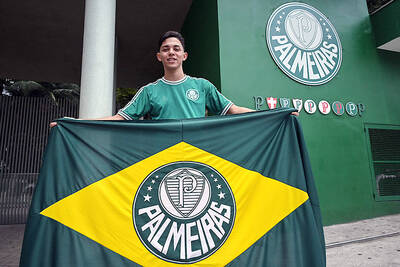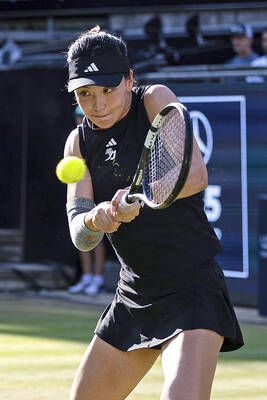Moonwalking into the center of a colorful gladiator-like stage, South African breakdancer Courtnae Paul warmed up a Johannesburg crowd with jazzy bobs and a contagious smile.
She was competing in one of the last few events left before the sports’ much-awaited Olympic debut. In the blink of an eye, she was upsidedown propped up by one tattooed arm, her brown-blonde ponytail swaying behind her.
Breaking, short for breakdancing, was added to the Paris Olympic roster after enjoying wide success at the Summer Youth Olympic Games in Buenos Aires in 2018.

Photo: AFP
“It’s a mixture of martial arts, gymnastics — all the cool stuff,” Paul said of the sport.
Her pierced face beaming with a dimpled grin, the dancer bagged her second career trophy at the prestigious Johannesburg tournament last month.
Born in the coastal city of Durban, the 32-year-old is one of seven African breakdancers — known as B-girls and B-boys — vying to make it to Paris. Along with a fellow South African B-girl, she is hoping to catch a break in upcoming qualifiers in Shanghai and Budapest.
Paul said she got into breakdancing almost by chance, having previously practiced gymnastics, kickboxing, Muay Thai and other sports.
After moving to Johannesburg dreaming of a professional dancing career, Paul started working as a choreographer, as well as backup dancer, DJ and media entrepreneur.
The decades-old street dance style always appealed to her, but she practiced mostly as a hobby, “doing nonsense until it formed into something,” thinking nothing much would come out of it, she said.
“There was nowhere for me to take it — no platforms existed,” she said.
Then in 2020, the COVID-19 pandemic hit with its lockdowns, giving Paul ample time to dedicate to her passion.
It was God’s way of saying: “‘Let’s get you back to the thing we want you to do,’” she said. “I’d like to have been, you know, six years younger, but I’ll take what I can get.”
She developed a unique style, which she describes as a mixture of her self-starter “roughness,” “education” and “South African flavor.”
Her trainer, Jaco Claasen, described her during a session as an “explosive” and “powerful lady” who literally throws herself into her moves.
In preparation for the Olympics, he said much of the work would go toward fine-tuning her stability and muscle connection to handle the force.
Forty other female dancers from across the world are competing in qualifiers this month and the next. Only 16 would go to Paris, where they would battle it out for gold through four one-on-one clashes or throwdowns, lasting up to 60 seconds. A DJ would choose the beat.
Their performance would be ranked based on criteria including technique, musicality and originality.
Paul said she was astounded when she learned that Paris was on the cards.
“Breaking has been added as an official Olympic sport,” she recalled a friend telling her. “I couldn’t believe it.”
However, chasing her dream has not been easy, as the nascent sport has yet to attract enough big sponsorships.
“Nine out of 10 times, everything is coming out of my pocket,” Paul said, adding that she can compete in only a handful of events a year, lacking the money to travel more. “In a perfect world, I’d be a professional athlete and get paid to train, eat and sleep, unfortunately in South Africa, that’s not my reality.”
Olympic visibility is hopefully going to change that, making life easier for future athletes, she said.
“The circuits that have been built around Olympic qualifiers are game-changing,” Paul said. “I’ve worked as hard as I can, and I’m as ready as I can be. A self-assured person is a dangerous one.”

Brazil has four teams, more than any other country, in the expanded Club World Cup that kicked off yesterday in the US, but for SE Palmeiras, the competition holds a special meaning: winning it would provide some redemption. Under coach Abel Ferreira since 2020, Palmeiras lifted two Copa Libertadores titles, plus Brazilian league, cup and state championships. Even before Ferreira, it boasted another South American crown and 11 league titles. The only major trophy missing is a world champions’ title. Other Brazilian clubs like Fluminense FC and Botafogo FR, also in the tournament, have never won it either, but the problem for Palmeiras

Lionel Messi drew vast crowds and showed flashes of his brilliance when his Inter Miami side were held to a goalless draw by African giants Al-Ahly as the revamped FIFA Club World Cup got off to a festive start on Saturday. Fans showed up en masse for the Group A clash at the Hard Rock Stadium, home to the NFL’s Miami Dolphins, but Messi could not fully deliver, his best chance coming through a last-second attempt that was deflected onto the crossbar. Inter Miami next face FC Porto on Thursday in Atlanta, while Al-Ahly, who benefited from raucous, massive support, are to

Twelve days after winning her second Grand Slam title at the French Open, Coco Gauff fell at the first hurdle on grass in Berlin on Thursday as beaten Paris finalist Aryna Sabalenka advanced to the quarter-finals. Recipient of a first round bye, American Gauff lost 6-3, 6-3 to Chinese qualifier Wang Xinyu as world number one Sabalenka beat Rebeka Masarova 6-2, 7-6 (8/6) in her second round tie. Winner of 10 main tour titles, including the US Open in 2023 and the WTA Finals last year, Gauff has yet to lift a trophy in a grass-court tournament. “After I won the first

Sergio Ramos on Tuesday outfoxed two Inter players and artfully headed home the first goal for Monterrey at the FIFA Club World Cup. The 39-year-old Ramos slipped through the penalty area for the score just as he did for so many years in the shirts of Real Madrid and Spain’s national team, with whom he combined smarts, timing and physicality. Ramos’ clever goal and his overall defensive play at the Rose Bowl were major factors in Monterrey’s impressive 1-1 draw against the UEFA Champions League finalists in the clubs’ first match of the tournament. “There is always a joy to contribute to the